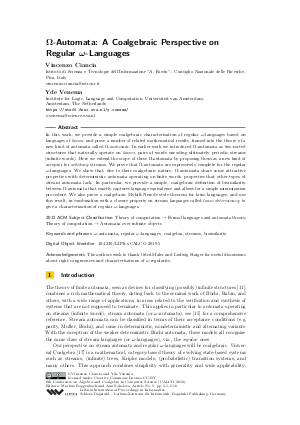LIPIcs.CALCO.2019.5.pdf
- Filesize: 0.5 MB
- 18 pages

 Creative Commons Attribution 3.0 Unported license
Creative Commons Attribution 3.0 Unported license

In this work, we provide a simple coalgebraic characterisation of regular omega-languages based on languages of lassos, and prove a number of related mathematical results, framed into the theory of a new kind of automata called Omega-automata. In earlier work we introduced Omega-automata as two-sorted structures that naturally operate on lassos, pairs of words encoding ultimately periodic streams (infinite words). Here we extend the scope of these Omega-automata by proposing them as a new kind of acceptor for arbitrary streams. We prove that Omega-automata are expressively complete for the regular omega-languages. We show that, due to their coalgebraic nature, Omega-automata share some attractive properties with deterministic automata operating on finite words, properties that other types of stream automata lack. In particular, we provide a simple, coalgebraic definition of bisimilarity between Omega-automata that exactly captures language equivalence and allows for a simple minimization procedure. We also prove a coalgebraic Myhill-Nerode style theorem for lasso languages, and use this result, in combination with a closure property on stream languages called lasso determinacy, to give a characterization of regular omega-languages.


Feedback for Dagstuhl Publishing